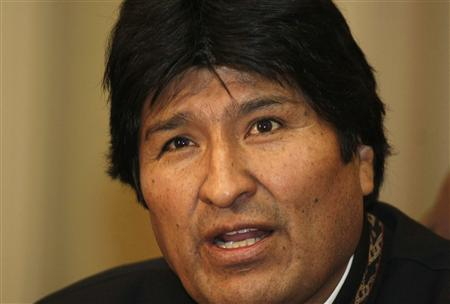
(above) Bolivia's President Evo Morales speaks with journalists at the presidential
palace in La Paz September 16, 2008. (photo: REUTERS/Gaston Brito)
Bolivia's Morales emerges stronger from crisis
September 17, 2008 - Reuters
By Eduardo Garcia - analysis
LA PAZ (Reuters) - Bolivia's first indigenous president, leftist Evo Morales, has deftly handled a violent political crisis and appears strengthened as he heads into talks with opposition governors who resist his socialist reforms.
At least 17 people were killed last week as anti-Morales protesters stormed government buildings, sabotaged natural gas pipelines and battled with the president's supporters in four opposition-controlled regions.
He ordered martial law in the remote Amazon province of Pando and arrested the governor there, accusing him of ordering a massacre of peasants last Thursday.
But soldiers showed restraint, taking a hands-off approach at times to avert confrontation. And South American presidents strongly backed Morales at an emergency summit this week, condemning any coup attempts or separatist rebellions.
"In South America there was unanimous and very strong support for the government. Other countries from the region, left, right and center, don't see the opposition as having a legitimate grievance," said Mark Weisbrot, head of the Washington-based Center for Economic and Policy Research.
Morales' measured approach contrasted with his detractors' violent protests and the killings that his government blamed on Pando Gov. Leopoldo Fernandez, who is being detained.
An editorial in El Deber, a top newspaper in opposition stronghold Santa Cruz province, said Morales had been "undeniably strengthened" by the South American presidents' backing and the opposition must rethink its protest strategy.
The rightist governors demand greater independence from the central government and more control over state energy revenues, an important element of the economy in the unstable, landlocked country at the heart of the continent.
In an accord reached on Tuesday, Morales agreed to discuss both issues in talks with the governors.
But a day later, he demanded that opposition lawmakers in Congress set a date for a referendum on a draft constitution and said the talks -- which he hopes will start on Wednesday -- should continue nonstop until a truce is reached.
Political scientist Franklin Pareja said Morales would only truly be strengthened if he made a deal with the opposition.
"There are no winners or losers, we all lose" after last week's deaths, Pareja said.
PLAN TO 'CONQUER'
A former coca-leaf farmer, Morales took power in early 2006 vowing to change the constitution to give more power to Bolivia's Indian majority and boost state control over natural resources.
He wants to put a draft constitution to a vote in the coming months, but political rivals oppose the charter as well as a plan to break up big estates to give land to the poor.
Both Morales and most of the opposition governors were ratified in a nationwide recall vote last month, with Morales winning 67 percent support.
El Mundo, another Santa Cruz newspaper, criticized the provincial governor and protest leader Branko Marinkovic for underestimating Morales' drive to "conquer" eastern regions.
The president draws most of his support from Bolivia's poor western highlands whereas opposition to his leftist policies is strongest in the east, home to the rich natural gas deposits, more fertile farmland and a European-descended elite.
Morales is friendly with Cuba's former leader Fidel Castro and with socialist Venezuelan President Hugo Chavez, and many in the east fear he aims to install a communist regime.
Morales' government has locked horns with right-wing governors and lawmakers ever since his allies approved the draft constitution during an opposition boycott last year.
And although the latest talks might break the deadlock, many analysts fear the dispute will continue.
Neither side "has resolved the real problems. They are just taking a break until they regain their strength," said Kathryn Ledebur, head of the Andean Information Network, a think-tank based in Bolivia.
(Additional reporting by Helen Popper in Buenos Aires; Writing by Hilary Burke; Editing by David Storey)